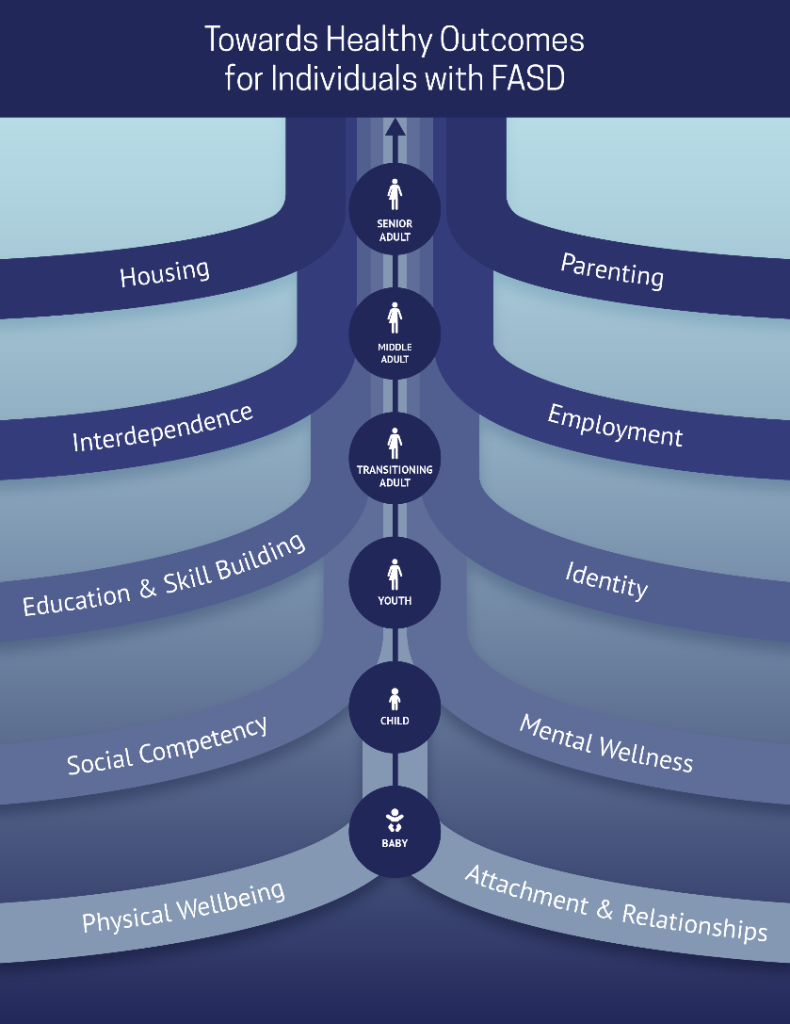The Towards Healthy Outcomes (THO) framework for individuals with FASD offers an individualized, evidence-based resource that facilitates collaborative goal-setting and intervention planning across the lifespan (Joly et al., 2022). THO was developed by the Intervention Network Action Team of Canada FASD Research Network, led by Dr. Jacqueline Pei and colleagues, and introduced to the community in 2019.
This resource has supported individuals with FASD, caregivers, frontline service providers, and others in their efforts to support healthy outcomes for individuals with FASD. THO has equipped us to reframe our thinking to adopt person-forward, strengths-based approaches to intervention – geared towards goal attainment and growth. In doing so, THO has supported the identification of strengths alongside areas of challenge to support overall wellbeing on the pathway to healthy outcomes.
Now, we are happy to announce version two of the Towards Healthy Outcomes framework: THO 2.0! This update is largely thanks to an incredible community response to the original THO and ongoing collaboration between researchers, individuals with FASD, and caregivers whose wisdom and insights have helped shape the evolution of the THO framework.

(Figure 1. The Towards Healthy Outcomes Framework 2.0 Visual)
What’s new in THO 2.0?
You will notice many core elements of THO remain the same. Updates reflect developments in the FASD research literature and the continued evolution of best practices. In particular, we have restructured the framework to consist of ten (rather than twelve) domains, adjusted our language to better reflect our strengths-based, goal-oriented perspective, increased efforts to highlight actionable steps, and have more intentionally integrated developmental and lifespan themes within each domain. The revised version also creates more space to highlight the voices of those with living experiences with FASD.
Restructured Framework
We restructured the THO framework by combining domains in two places:
- Recognizing the overlap between Family Cohesion within Attachment, we created an integrated Attachment & Relationships domain. This new domain highlights the value of early attachment experiences alongside familial and support stability and relationships across the lifespan.
- The new Interdependence domain is a combination of the original Adaptive Functioning and Community Engagement domains. The concept of interdependence was introduced to us through work with community members, including individuals with FASD and caregivers, and refers to finding the balance between support and autonomy with individuals. It exists along a spectrum and fluctuates across the lifespan.
Evolving Language
We have updated the language used throughout THO 2.0 to emphasize its underlying strengths-based, empowered, and goal-oriented core philosophies. This includes subtle adjustments to domain names to highlight goal-oriented, developmental objectives and expand each domain’s reach. For example, we renamed the Mental Health and Regulation domain Mental Wellness to incorporate a wide range of promotive, preventative, responsive, and solution-based strategies that support wellness and address mental health concerns.
Actioned Research
We have adjusted how research is presented in THO 2.0 to highlight how the evidence can be put into action. We have also organized this content within a new structure. Each domain is now broken into three sections, which we hope will increase the practicality of the content and enable individuals with living experiences to:
- Learn about essential developmental domains and their contributions to lifelong functioning.
- Understand how development may be uniquely impacted for individuals with FASD.
- Enact FASD-informed approaches to intervention and support based on current FASD resources and research evidence.
We are excited by how community members have embraced the original THO and found ways to enact this framework within policy, practice, and planning initiatives. Feedback from the community regarding the value of shared communication approaches has shifted our perspectives, and accessible research has fueled the development of THO 2.0. We hope the revised THO 2.0 continues to serve the community well and we look forward to working closely with partners to realize how this framework can support an integrated practice that ultimately supports families and individuals in pursuit of healthy outcomes.
Conclusion
We look forward to continually working with the community as we consider ways to increase knowledge through training, challenge bias through open conversation, and monitor impacts and outcomes for ongoing adaptation of supports and services, all of which will set us up for best practice across and between systems, and within families and communities.
“Growth is so dependent on society and finding a way to embrace all differences – race, gender, brain differences.” Caregiver of an individual with FASD
And finally, a huge thank you to all who shared their experiences, thoughts and wisdom with us. THO 2.0 would not have been possible without the critical support of:
- Individuals with FASD, caregivers, and their families who are exceedingly generous with their time and expertise. They have inspired so much of this work!
- Community members, frontline service providers, educators, and policymakers whose courage to try new things creates windows of opportunity.
- The many others who have sought healthy outcomes for people with FASD!
We hope that you enjoy THO 2.0! This framework was produced by Jacqueline Pei, Vannesa Joly, Kathleen Kennedy and Katherine Flannigan.
